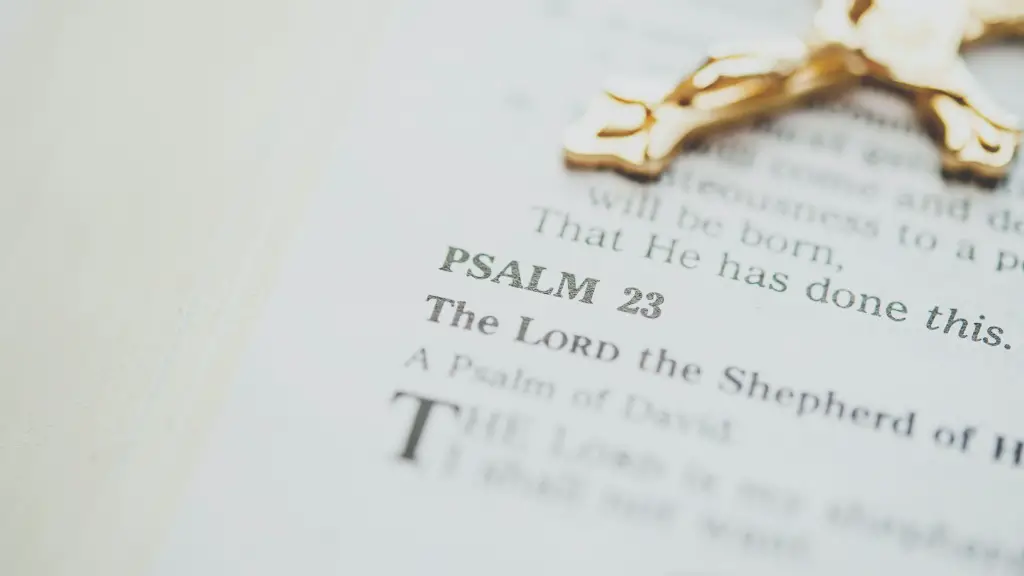How long is a day in the Bible? Many Christians have asked this question since the Bible speaks of days as lasting a 24 hour period. In this short article, we will explore the various interpretations of the answer, and draw our own conclusions based on the evidence available.
In the Old Testament, God is described as creating the world in six days and resting on the seventh. It’s clear that these days are 24 hours in duration, as that is the amount of time it takes for the sun to cross the sky. However, the Bible also makes abundant use of symbolic language when discussing spiritual matters, so this could be interpreted as seven periods, with each day carrying a special meaning. In this case, each of the days would represent a different stage in the creative process, with the seventh being a period of rest and contemplation.
The New Testament doesn’t necessarily contradict this interpretation. Jesus mentions “a day is as a thousand years” in reference to the Second Coming, implying that a day can be seen as a much longer period of time. This could be interpreted to mean that each of the days of creation represents a longer period, covering multiple millennia. In this more symbolic reading, each day was still significant within the creative process, but took place over a much longer span of time.
Many Christians argue both interpretations are incorrect and that, to fully understand God’s purpose, the question should be approached from a scriptural and theological, rather than an astronomical perspective.
The Bible contains several references to a day as a “time-span”, rather than as a 24 hour period. These references include a “thousand years as a day”, as well as the concept of a day lasting “to the end of the world”. This could imply that each day in the Bible represents the beginning of a new age, with each day focusing on the completion of a single work by God – the work of Creation.
The Possibility of Day-Age Creationism
Day-Age Creationism is the belief that the days described in the Creation story may have been much longer than 24 hours. This creationist interpretation fits with scientific data that suggests the Earth may be much older than the 6,000 years suggested by various biblical scholars.
Adherents of Day-Age Creationism argue that the seven days of Creation were each meant to represent a long period of time in which God was creating the world. In this case, the “day” would represent a much longer period of time, with each day representing millions or billions of years.
Day-Age Creationism is viewed by many Christians as a compromise between the literal interpretation of the Bible and the findings of modern science. It provides a way for examining the Creation story without compromising one’s belief in the infallibility of scripture.
The Church’s Stance on Day Length
The Catholic Church has a long history of grappling with the nature of days in the Bible. The Council of Trent, which was convened in the sixteenth century, declared that “by the authority of our Lord Jesus Christ, of the blessed apostles Peter and Paul, and of the holy Council, we do declare, that the day and night, which in the scriptures of God are said to be of twenty-four hours every one, are to be taken in a proper, literal, and obvious sense.” This statement, while certainly not binding today, illustrates the late medieval Church’s desire to reconcile the literal and symbolic interpretation of the Bible.
The Church has continued to debate the issue of day length in the Bible. In recent years, the Second Vatican Council declared that “the sacred text must be read and understood in the literal meaning intended by the human authors, who wrote it under the inspiration of the Holy Spirit.” This statement strongly implies that the Church is still pushing for a literal interpretation of the Bible, including a literal 24 hour day.
The Meaning of Day in the Bible
Ultimately, the meaning of day in the Bible is open to interpretation. Some argue for a literal and obvious interpretation, while others argue for a more nuanced interpretation. The Church has contributed to the debate, but has not definitively declared one interpretation to be right or wrong. Each person must make their own decisions based on their own understandings of their faith.
For some, this might mean accepting a literal interpretation of the Creation story and its description of days as 24 hour periods. For others, it might mean accepting a more spiritual and symbolic meaning of the days in the Creation story. Whatever the interpretation, it is important to remember that the Bible does not provide a concrete answer to the question “How long is a day in the Bible?”
Myths and Legends of the Bible
Some of the most famous stories from the Bible, such as the creation myth, are open to multiple interpretations. It is believed that the myth of the creation story is based on an older myth from Mesopotamia. This myth described the world as being designed by gods who acted as agents of chaos rather than order. This myth speaks to the intertwined nature of creation and destruction. It also demonstrates how different cultures have interpreted creation mythologies in their own ways.
The Bible, in its own narrative, speaks of a more orderly and structured creation myth. This myth suggests that creation was an intentionally ordered process, determined by God, with the seven days providing a clear timeline for the world’s development.
In this narrative, the days are used as a means of conveying the idea of gradual growth, from nothingness to the world today. The seven days of Creation could thus be read as a metaphor for the power of God to take something from nothing, or the process of accepting that something can change, even if it takes time.
The Debate Around the Seven Day Exodus
A number of religious scholars have argued that the story of the Exodus is similar to the creation myth, in that it also follows the structure of seven days. This interpretation suggests that the number of days is not literal, but rather symbolic of the power of God to bring about change. This interpretation implies that the days are used to demonstrate the process of change and the power of faith to bring it about.
There have been a number of debates over the correct interpretation of the seven days of the Exodus. While some favour a literal interpretation, many religious scholars have argued for a more figurative interpretation. This interpretation suggests that each day of the Exodus represents a new stage of faith, as well as illustrating the power of prayer and trust in God.
At the same time, a literal interpretation of the Exodus story has also found favour with religious scholars. In this interpretation, each day marks a new stage in the journey of the Israelites from captivity to freedom. This interpretation suggests that the seven days represent a physical, as well as a spiritual journey.
Scientific Support of the Creation Myth
What is striking about the creation myth is that it turns out to have a good deal of scientific support. The universe was likely created over billions of years, and the Big Bang Theory would be consistent with the creation myth. In addition, modern cosmology and astrophysics all point to the likely existence of a creator. This could be seen as confirmation of the Creation myth, lending scientific support to the story.
At the same time, it is important to bear in mind that the Bible was written long before modern science had developed its theories of the universe. This means that, in many ways, the Bible was a pioneering work of scientific writing, which provided an accurate account of the universe without being able to draw on the evidence of modern science.
This is further evidence for the idea that the days of the Creation and Exodus stories were not intended to be interpreted literally, but instead were meant to illustrate the principle that God was responsible for the creation and development of the world.
Interpreting Days in the Bible
Ultimately, the Bible provides no clear answer to the question “How long is a day in the Bible?” Each person must draw their own conclusions as to the length of a day in the stories of creation and Exodus. Some may favour a literal interpretation, with days being 24 hours in length, while others may favour a more symbolic interpretation, interpreting days as longer periods of time.
The debate over the length of days in the Bible is likely to continue, as each person uses their own interpretation to make sense of the stories of the Bible. However, one thing is sure: whatever interpretation is chosen, it is certain that days are an important part of the biblical narrative.





